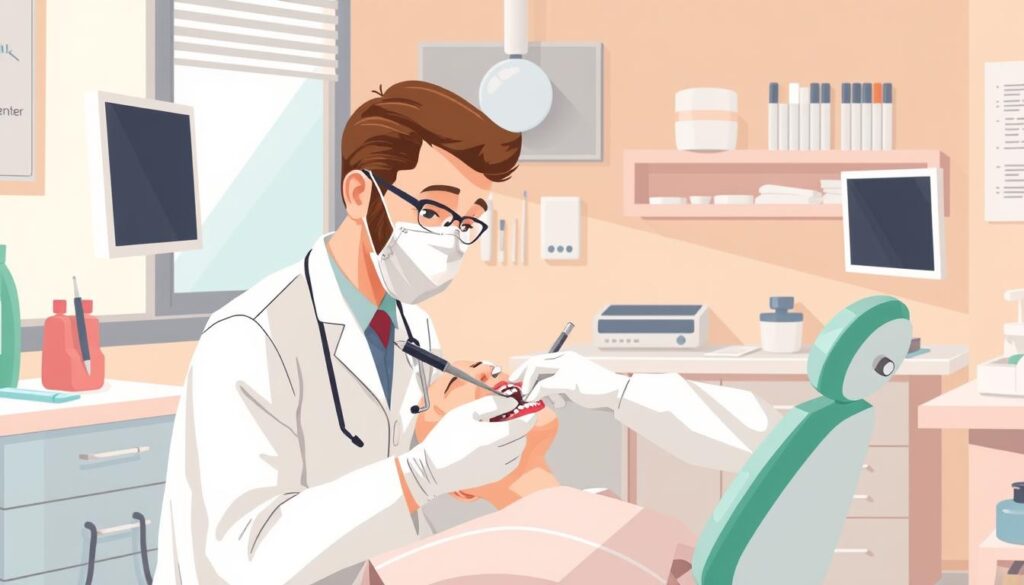Dental Cleaning
Dental cleaning, also referred to as prophylaxis, is far more than just a cosmetic polish for your teeth—it’s a foundational part of preventive dental care that protects your smile and your health. While daily brushing and flossing are important, they are not enough to remove the hardened plaque and tartar that accumulate over time. That’s where professional dental cleaning comes in.

Why Regular Cleanings Matter
By scheduling routine cleanings every six months, you’re taking a proactive step to maintain optimal oral hygiene, prevent tooth decay, and protect against serious gum infections, such as gingivitis or periodontitis.The benefits go beyond your mouth.Scientific studies have shown that poor oral health is closely linked to a range of systemic health issues, including heart disease, diabetes complications, respiratory infections, and even pregnancy-related risks.
Whether your goal is to maintain a bright, confident smile, avoid costly dental procedures down the line, or protect your overall health, regular dental cleaning is your first line of defense. It’s one of the simplest yet most powerful habits you can adopt for long-term wellness.
In this comprehensive article, we’ll explore everything you need to know about professional dental cleanings—from what the procedure involves, how often you should get it, to the many benefits it offers for both children and adults. You’ll also learn how cleanings differ from deep cleaning treatments, and what you can do at home to support the results.
Let’s dive in and uncover the secrets to a healthier smile!
🦷 Dental Cleaning definition?
Dental cleaning, also known as prophylaxis, is a routine yet essential preventive dental procedure carried out by a licensed dentist or dental hygienist. Its main objective is to remove plaque, tartar (calculus), and surface stains that accumulate on the teeth over time. Daily brushing and flossing are necessary, but they simply can’t reach every crevice…
If left untreated, this bacterial buildup can contribute to tooth decay…
That’s why professional dental cleanings are essential—they’re designed to address these risks
Left untreated, this bacterial buildup can contribute to the development of tooth decay, gingivitis, and periodontal (gum) disease, which may eventually lead to tooth loss and more serious health problems. Professional dental cleanings are designed to address these risks before they progress into complex conditions.
Top Oral Health Benefits of Routine Cleaning
• Prevents cavities and gum disease
• Removes surface stains, giving your teeth a naturally brighter appearance
• Reduces bad breath (halitosis) caused by plaque and food debris
• Aids in the early detection of issues like decay, infection, or oral cancer
Prophylaxis is a cornerstone of good oral hygiene and should not be overlooked. It’s quick, non-invasive, and highly effective in maintaining a clean and healthy smile.
👉 Related Reading: Explore our preventive services to keep your teeth healthy year-round
What to Expect During Your Dental Cleaning Appointment

A dental cleaning typically involves several steps. While the exact process may vary slightly between clinics, here’s what you can generally expect during your visit:
Step 1: Oral Exam
Your hygienist starts with a mirror-assisted examination of your mouth, checking for signs of inflammation, decay, or oral cancer.
Step 2: Scaling
Using a scaler, your hygienist removes plaque and tartar deposits around your gum line and between teeth.
🧠 Did You Know? Tartar can only be removed by a dental professional. Brushing and flossing can’t eliminate hardened deposits.
Step 3: Polishing
After scaling, your teeth are polished using a gritty paste that removes surface stains and leaves your teeth feeling smooth and clean.
Step 4: Flossing & Rinsing
Professional flossing helps remove leftover debris. Finally, your mouth is rinsed to eliminate any remaining particles.
Step 5: Fluoride Treatment (Optional)
Some clinics offer a fluoride varnish or gel to strengthen enamel and prevent future decay.
How Often Should You Visit the Dentist for Cleaning?

Most dentists recommend scheduling a professional dental cleaning every six months to maintain healthy teeth and gums. This biannual frequency helps prevent the buildup of plaque and tartar, which are the leading causes of cavities, bad breath, and gum disease. Regular cleanings also allow your dentist to monitor your oral health and catch any issues early before they require extensive treatment.
However, not everyone has the same dental needs. Some individuals may require more frequent cleanings—every 3 to 4 months—depending on their oral health status and risk factors.
You may benefit from more frequent dental cleanings if you:
- Have a history of gum disease or periodontitis
- Are naturally prone to plaque or tartar buildup
- Wear braces or orthodontic appliances, which can trap food and bacteria
- Live with chronic health conditions like diabetes, which are linked to a higher risk of oral infections
More frequent cleanings help manage these risks and ensure optimal dental health throughout the year.
👶 Wondering about your child’s dental schedule? Check out our page on Pediatric Dentistry to learn how often kids should receive professional cleanings based on their age and needs.
🧪 Dental Cleaning vs. Deep Cleaning: What’s the Difference?
While both procedures involve cleaning your teeth, prophylaxis and scaling and root planing (deep cleaning) are not the same.
| Feature | Prophylaxis | Deep Cleaning (SRP) |
| Target Group | General patients | Patients with gum disease |
| Depth | Above the gum line | Below the gum line |
| Frequency | Every 6 months | As prescribed (may be 3-4x/year) |
| Purpose | Preventive maintenance | Treat periodontal disease |
If you’re diagnosed with periodontitis, your dentist may recommend a deep cleaning instead of a regular cleaning.
Home Care Tips to Support Your Cleanings
Maintaining oral hygiene at home is essential—but it’s not enough.
🏡 At-Home Oral Hygiene:
- Brushing twice a day with fluoride toothpaste
- Daily flossing
- Using antibacterial mouthwash
- Eating a tooth-friendly diet
👩⚕️ Why Dental Cleanings Are Still Necessary:
- Only professionals can remove tartar
- Early signs of decay or disease can be missed at home
- Cleanings allow for early diagnosis of serious issues like oral cancer
According to the American Dental Association (ADA), professional dental cleanings are a critical component of lifelong oral health care (Source).
😷 Can Dental Cleaning Improve Overall Health?
Yes—numerous scientific studies have shown a strong and undeniable connection between oral health and overall health. Your mouth is the gateway to your body, and poor oral hygiene can allow harmful bacteria to enter the bloodstream, leading to inflammation and affecting multiple organ systems.
How Oral Health Impacts the Body
When plaque and tartar are left untreated, they contribute not only to gum disease and tooth decay but also to more serious systemic health issues. This is why routine dental cleanings play such a critical role in your general well-being.
Health Conditions Linked to Poor Oral Hygiene:
- Cardiovascular disease – Gum disease may increase the risk of heart attack and stroke
- Diabetes complications – Poor oral health can worsen blood sugar control
- Respiratory infections – Inhaling bacteria from infected gums may lead to lung infections
- Pregnancy complications – Gum disease has been associated with low birth weight and premature birth
By removing bacteria and reducing inflammation, regular dental cleanings can significantly lower your risk of these health problems.
💡 Fun Fact: Studies suggest that gum disease may also increase the risk of Alzheimer’s disease, making oral care important not just for your smile but for your brain health too.
💰 Dental Cleaning Cost in Kenya
The cost of a dental cleaning can vary depending on the clinic and location. On average:
- Nairobi: KES 2,000 – KES 5,000
- Mombasa: KES 1,800 – KES 4,500
- Kisumu: KES 1,500 – KES 3,500
Some dental plans may cover prophylaxis under preventive care benefits. It’s best to check with your provider.
If you’re in Kenya, book a same-day dental cleaning appointment with a certified Kenya dentist.
❓ FAQs About Dental Cleaning
❓ Is dental cleaning painful?
Generally, it is not painful. You may feel slight discomfort if you have sensitive teeth or inflamed gums, but most people find the procedure easy and comfortable.
❓ Can I eat after a dental cleaning?
Yes! But if you’ve had fluoride treatment, wait at least 30 minutes before eating or drinking.
❓ What age should children start getting dental cleanings?
The first cleaning is recommended around age 1, or within 6 months of the first tooth erupting.
📈 Top 7 Benefits of Dental Cleaning
Oral Health Benefits
· 1.Prevents Tooth Decay
Routine cleanings remove plaque before it hardens into tartar, reducing the risk of cavities and tooth decay. This keeps your enamel strong and your smile healthy.
· 2.Reduces Risk of Gum Disease
By eliminating bacteria and buildup near the gum line, professional cleanings help prevent gingivitis and periodontal disease, which can lead to tooth loss if left untreated.
· 3.Whitens Your Smile
Cleanings polish away surface stains caused by coffee, tea, wine, and tobacco—giving you a visibly brighter and more confident smile without the need for whitening treatments.
· 4. Freshens Breath
Persistent bad breath (halitosis) is often caused by trapped food particles and bacteria. Dental cleaning removes these odor-causing agents, leaving your mouth feeling clean and fresh.
Health & Financial Benefits
· 5. Early Detection of Oral Issues
Dentists can spot early signs of tooth decay, gum disease, or even oral cancer during a routine cleaning, allowing for timely intervention and better outcomes.
· 6. Boosts Overall Health
Good oral hygiene supports heart health, diabetes management, and respiratory wellness by reducing systemic inflammation linked to oral infections.
· 7. Saves Money on Future Treatments
Preventive care is far more affordable than treating advanced dental problems. Regular cleanings help you avoid costly procedures like fillings, root canals, or extractions.
⚠️ Signs You’re Overdue for a Dental Cleaning
If you’re experiencing any of the following symptoms, it may be a clear sign that you’re overdue for a professional dental cleaning. Ignoring these warning signs can lead to more serious dental issues over time:
- Bleeding Gums
If your gums bleed when brushing or flossing, it could indicate the early stages of gum disease (gingivitis), which is reversible with timely cleaning and care. - Persistent Bad Breath
Chronic bad breath (halitosis) may be caused by plaque buildup or bacterial infections below the gum line, which a dental cleaning can eliminate. - Visible Tartar Buildup
Yellow or brown deposits on your teeth, especially near the gum line, are hardened tartar that cannot be removed at home. - Gum Recession
If your teeth look longer or your gums are pulling away, it could be due to periodontal disease requiring professional attention. - Tooth Sensitivity
Heightened sensitivity to hot, cold, or sweet foods may signal enamel erosion or gum issues—both treatable with regular cleanings and checkups.
🌿 Natural Remedies vs. Professional dental Cleaning
Many people use natural methods like oil pulling, baking soda, or charcoal toothpaste. While these can help with minor surface stains or plaque, they can’t replace professional cleaning.
Why DIY Isn’t Enough:
- No removal of hardened tartar
- Doesn’t treat gum disease
- May cause enamel erosion if overused
For best results, combine home care with biannual professional cleanings.
✅ Aftercare Tips for Cleaner, Healthier Teeth
To keep your teeth clean between visits:
- Switch to an electric toothbrush
- Replace your toothbrush every 3 months
- Use interdental brushes or floss picks
- Avoid sugary snacks and sticky foods
- Rinse with fluoride mouthwash
Looking for a reliable clinic? Find the best dental clinic in Kenya near you.
👨⚕️ What to Ask Your Dentist During a Cleaning
Make the most of your appointment by asking questions like:
- “Do I have any early signs of gum disease?”
- “How can I improve my brushing technique?”
- “Do I need fluoride treatment?”
- “What areas should I focus on more at home?”
🧭 Final Thoughts: Why You Should Never Skip Dental Cleaning
Skipping dental cleanings may save time in the short term, but it can lead to costly, painful procedures later. Regular prophylaxis is a smart, proactive choice for anyone serious about oral and overall health.
Take the first step toward a healthier smile today. Book your cleaning with a trusted Kenya dentist now.